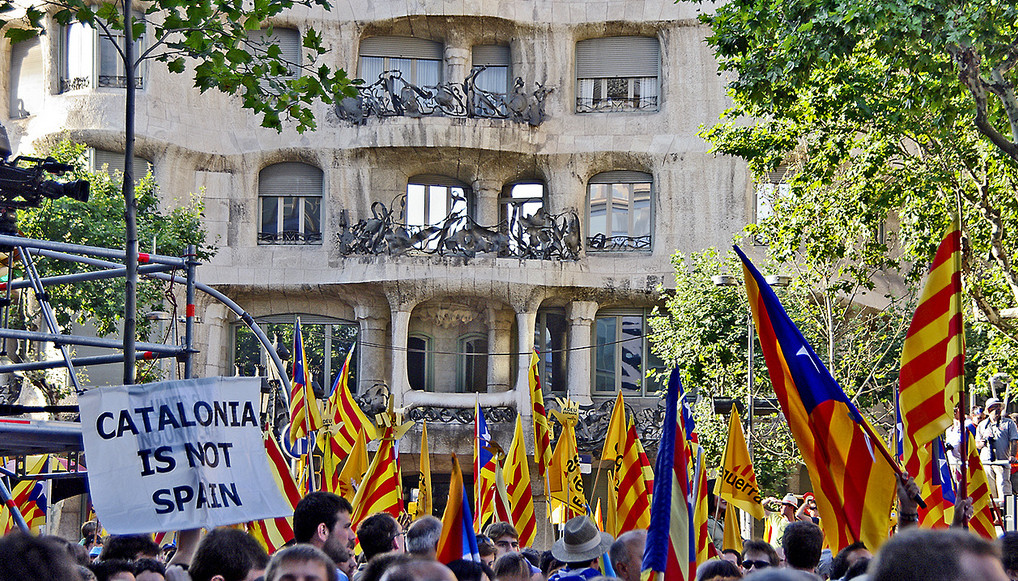Editor’s note: Last week, BPR Online had the pleasure of publishing two pieces on the Catalan independence movement, written by guest columnists Jorge Tamames and Daniel Bogre Udell. These can be found here and here. This week, the authors are using BPR Online as a forum to respond to each other’s columns; these responses are below.
A note from Daniel Bogre Udell
When my colleague Jorge Tamames and I originally agreed to write complementary articles on the Catalan question, we were expecting to at least somewhat disagree. As our essays came to reveal, however, we are on the same side of the isle, endorsing the view that the Spanish government’s historical tendency towards centralism has been a primary factor in the development of Catalan nationalism, and that the country’s right-wing People’s Party, to which Prime Minister Mariano Rajoy pertains, has done a great deal to inspire the recent surge of separatism in Catalonia — or as Catalan separatists often prefer to be called, independentists. (The logic here is the point of reference; the sovereignty movement should be framed as an attempt to secure independence for Catalonia as opposed to an attempt to separate from Spain.) However, given that we come from different backgrounds — political science in Mr. Tamames’s case and history in mine — and, as he put it, we write from different sides of the Ebro — Mr. Tamames is from Madrid while my sympathies developed working for Catalan politicians in Barcelona — there is nuance between our arguments that is worthy of note.
There is a tendency among social scientists to treat our disciplines as if they were actually sciences, a habit that can compel us to analyze subjective topics with an objective insensitivity. When Mr. Tamames asserts that he “lacks sympathy for nationalism regardless of the flag in question,” he reductively lumps all nationalisms together simply for being ideologies centered around the idea of nation — a philosophical position, especially common among cosmopolitans, that stems from lack of interest in duly analyzing different nationalist movements according to their social and historical circumstances. But nationalisms are not all the same.
Hitler is a striking reminder that nationalism can be a dangerous force for racism and tyranny. On the other hand, Ghandi is a reminder that nationalism can be a positive force. In fact, a majority of the 19th and 20th century’s nationalist movements drove millions in Africa, Asia and the Americas to fight for independence from colonial empires. And stateless nationalisms today — in Kurdistan, Palestine, Catalonia and elsewhere — are political ideologies that have helped marginalized peoples sustain their identities and cultures. Why shouldn’t we sympathize with Catalan nationalists? Is their desire for a more articulate voice in geopolitics frivolous?
I argue that it is not. I also argue that Spanish claims to nationhood are reasonable. As I wrote in my own essay, both identities play important roles in the lives of millions of people, and they will continue to do so even if Catalonia secedes from Spain. Both nations will exist, subjectively imagined and objectively represented in politics, far from being “irrelevant parodies of a former country,” as Mr. Tamames fears.
A note from Jorge Tamames
Daniel Udell’s views on Catalonia’s independence are surprisingly similar to mine. This comes as a pleasant surprise because we write from opposing viewpoints — Udell is sympathetic to Catalonia’s leading pro-independence party, while I am a madrileño born and bred. Yet we both view Spain’s recurring, centralizing fits as an active cause of secessionism, and envision a multi-national Spain, federal or confederated, as the optimal outcome of current unrest.
Our differences spring from our respective approaches to the question of Catalan secessionism. I see its rise as a consequence of the breakdown of post-Franco democracy and the dictatorship’s enduring ideological legacy. Udell views the issue historically, focusing on the tension between Madrid’s centralizing impulses and Catalonia’s evolving sense of nationhood.
While history is necessary to understand Catalan secessionism — I have argued the same in the past –, I am reluctant to frame the debate in terms of national identities. The reason for this is not that I consider nationalism to be categorically evil, but rather that Catalan as well as Spanish national identities are contested concepts and slippery objects of analysis. Despite homogenizing fantasies Spain necessitates peripheral nationalisms; without Catalonia — or the Basque Country, or Galicia — the country would be reduced to Castile. I am equally skeptical that Catalan claims to nationhood can be formulated without oversimplifying Catalonia’s relationship with Spain — and thus damaging the diversity we both view as periodically threatened by Madrid. What is to be done with Javier Cercas, Eduardo Mendoza, or the late Juan Marsé, to name just a few Catalan writers who made the mistake of choosing Spanish over “the nation’s language”? An increasingly common answer is that they are not true Catalans.
Perhaps it is also the slippery nature of nationhood that leads Udell to assert that “lack of political sovereignty implies a lack of nationhood.” This may be true, but it does not follow that nationhood begets sovereignty. Greece has a strong sense of nationhood; it is nonetheless hostage to the European Commission’s diktats and the whims of Germany’s electorate. The capacity to exercise sovereignty is a reflection of power hard and soft, and I doubt a Catalonia locked in European institutions would have much of either — Spain certainly does not. Added to the fact that a hypothetically independent Barcelona would soon rush to Brussels cap in hand, one has to wonder whether independence and sovereignty are linked at all. Catalans should pause and reflect upon Teresa of Ávila’s words: more tears are shed over answered prayers than over unanswered prayers.
